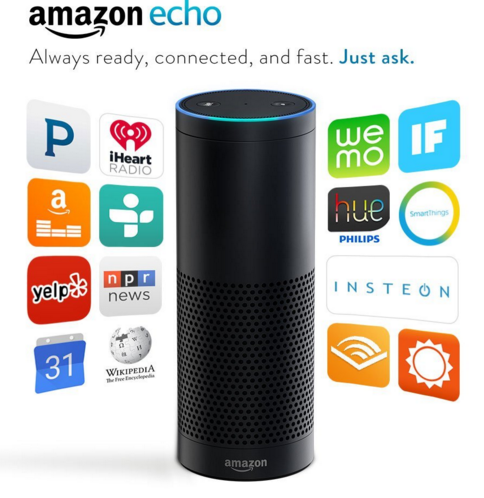
In a previous column I mentioned the Amazon Echo ($179 on Amazon.com) as a useful device for listening to music and podcasts. But, after using the Echo for the past month and hearing others talk about it as CES, I’ve come to the conclusion that it’s far more than that. It’s reminiscent of the voice command computers in Star Trek and Hal, from Arthur C. Clarke’s A Space Odyssey.
I bought the Echo as a music player because I was impressed at how easy it is to use your voice to play songs from your own music library that you’ve uploaded to Amazon music along with the million or so songs on Amazon Prime Music, your Pandora playlists and the podcasts, music and online radio stations on TuneIn and iHeartRadio.
You address the Echo as “Alexa,” Amazon’s persona that’s equivalent to Siri or the OK Google voice commands for Android devices. Amazon also gives you the option to address Echo as “Amazon,” but I prefer calling her Alexa.
The difference between Alexa and its Google and Apple equivalents — for now at least — is that the Echo device is designed as a home appliance that’s always listening and always ready to carry out your command. Even if it’s playing music it can usually understand and follow your voice commands. I have two Echos. One is in my dining area, but it’s sensors are sometimes able to hear me from an adjacent room.
As I was watching a recent Republican presidential debate in my living room, I was curious about the age of the front-runner so I shouted out “Alexa, how old is Donald Trump” and she immediately looked up his age (she has access to Wikipedia) and told me “Donald Trump is 69 years old.”
My other Echo is in my bedroom and, just about every night before bed, I ask her to read aloud my schedule for the next day, which she knows because I connected her with my Google calendar. I then tell her what time to wake me up the next morning and, if I’m having trouble sleeping after the lights are out, I ask her to play some soft music and tell her to stop playing after 30 minutes or so. If I wake up in middle of night and wonder what time it is, I can say “Alexa, what time is it” without having to turn on the light and put on my glasses to look at the clock. In the morning, I ask Alexa for a weather report and she can also report on commute traffic.
You can also use Echo to listen to books from Audible or have it read your Kindle books aloud. Alexa can control home appliances via a number of home automation platforms including WeMo, Philips Hue, Samsung SmartThings, Wink and Insteon. I sometimes turn on a space heater or a fan before I go to bed and like the ability to turn it off in the middle of the night by voice instead of having to turn on the light to operate a remote control or a switch on the device itself.
Amazon didn’t have a booth at the recent CES technology show in Las Vegas but lots of vendors were there supporting the Echo and Alexa. Ford, for example, announced that it will soon be possible to use the Echo to remotely unlock or start your car from your home as well as to use Alexa commands from your car to turn on your home’s lights or while driving.
Vivint, which makes home security products, announced that you can now use Alexa to control their devices so you can lock or unlock your doors, for example, with the sound of your voice. Vivint also allows you to use Alexa to control Nest appliances, which is ironic since Nest is owned by Google, which, almost certainly, will eventually have its own voice enabled home control systems.
The current Echo device has its flaws. Although the 360 degree single speaker is pretty good for its size, there are far better speaker systems available but the Echo sadly lacks a headphone jack or Bluetooth support for external speakers. And there is no battery. though there are rumors that a portable Echo will be announced soon.
Hopefully, Amazon is thinking way beyond its current offering, towards a family of products built around Alexa.
And, of course, Amazon is far from alone. Apple is aggressively working to expand Siri’s repertoire of skills at home and in the car. As it is, Siri is already able to recognize voice commands in the background, even if the iOS device is running another app, so an iPhone or iPad can already perform some of the Echo’s tricks. Google is working hard to improve its own speech recognition that I use every day to get my phone to make calls, look up driving directions and search the web without having to even tough the screen.
I have no doubt that voice recognition is going to get even better over the next decade and help usher in all sorts of new devices as well as better and easier ways to control the devices we now have. It’s so great to see Star Trek technology come to life but I’m still waiting for my transporter teleportation system to “beam me up.” If it ever is invented, its persona will, of course, be named “Scotty.”